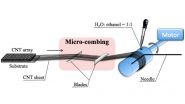"Our results suggest exciting possibilities for further developing and implementing this treatment in a wider group of patients with gastrointestinal illness," says Braden Kuo, MD, of the Gastrointestinal Unit in the MGH Department of Medicine, co-lead author of the PLOS ONE report. "Several studies have found that stress management techniques and other psychological interventions can help patients with IBS, at least in the short term; and while the evidence for IBD is less apparent, some studies have suggested potential benefits. What is novel about our study is demonstration of the impact of a mind/body intervention on the genes controlling inflammatory factors that are known to play a major role in IBD and possibly in IBS."
Both IBS and IBD are chronic conditions that produce related symptoms, including abdominal pain and changes in bowel function such as diarrhea. But while IBD - which includes Crohn's disease and ulcerative colitis - is characterized by severe inflammation in all or part of the gastrointestinal tract, no inflammation or visible abnormality is present in IBS. Stress appears to exacerbate both conditions, and since the symptoms themselves can increase stress in patients, finding ways to break that vicious cycle could have significant clinical benefits.
The relaxation response - a physiologic state of deep rest induced by practices such as meditation, yoga and prayer - was first described more than 40 years ago by Herbert Benson, MD, director emeritus of the Benson-Henry Institute and a co-author of the current paper. Many studies have shown that regular practice of the relaxation response not only alleviates stress and anxiety but also directly affects physiologic factors such as blood pressure, heart rate and oxygen consumption. In reports published in 2008 and 2013 Benson, Towia Libermann, PhD and Manoj Bhasin, PhD - both of the BIDMC Genomics, Proteomics, Bioinformatics and Systems Biology Center - described finding how elicitation of the relaxation response in healthy individuals affects the expression of genes in pathways involved with the body's response to stress, inflammation and energy metabolism. Libermann is co-senior author and Bhasin is co-lead author of the current study.
The current study was designed both to investigate whether a relaxation-response-based intervention could improve the quality of life in patients with IBS or IBD and to analyze the intervention's effects on inflammatory markers and gene expression. The study enrolled 48 adult participants - 19 of whom had been diagnosed with IBS and 29 diagnosed with IBD - who participated in a nine-week group program focused on stress reduction, cognitive skills and health-enhancing behaviors. Each of the weekly sessions included relaxation response training, and participants were asked to practice relaxation response elicitation at home for 15 to 20 minutes each day. Along with aspects featured in other group programs offered at the Benson-Henry Institute, this program included a session specifically focused on gastrointestinal health.
Study participants were assessed at the outset, midway through and at the end of the program, and then three weeks later. The assessments used standardized tools for measuring symptoms common to both disorders, for assessing anxiety and pain, and for determining the effects of the disorders on participants' quality of life. Blood samples were taken at baseline and a week after the study period's conclusion for purposes of profiling gene expression and measuring known inflammatory factors.
Both in patients with IBS and those with IBD, participation in the mind/body program appeared to have significantly improved disease-related symptoms, anxiety and overall quality of life, not only at the end of the study period but also three weeks later. While there were no significant changes in inflammatory markers for either group of participants, changes in expression were observed in almost 200 genes among participants with IBS and more than 1,000 genes in those with IBD. Many of the genes with altered expression are known to contribute to pathways involved with stress response and inflammation.
"In both IBS and IBD, the pathway controlled by a protein called NF-?B emerged as one of those most significantly affected by the relaxation response, which confirms the findings of our previous genomic studies," says Libermann. "Indeed the relaxation response reduced the expression of a number of genes directly linked to the key inflammatory processes of IBD. While the mechanisms behind IBS are less well defined, they most likely involve stress response, which also could be improved by relaxation response practice."
Co-senior author John Denninger, MD, PhD, of the Benson-Henry Institute at MGH notes, "One interesting clinical impact was a decrease in both IBS and IBD patients in what is called pain catastrophizing - a negative cognitive and emotional response to pain or the anticipation of pain. In other words, participants became more resilient in the face of the pain they were experiencing. But before we can offer a program like this to patients with these disorders, we'll need to conduct a longer, randomized trial with a control group and enough participants for statistically significant results."
INFORMATION:
Joshua Korzenik, MD, formerly of the MGH Gastrointestinal Unit and now at Brigham and Women's Hospital, is also a co-senior author of the PLOS ONE paper. Additional co-authors are Jolene Jacquart, Matthew A. Scult, Lauren Slipp, Eric Isaac Kagan Riklin, Nicole Hasheminejad, Leslee Kagan , Ellen Slawsby and Gregory Fricchione, Benson-Henry Institute; Nicole Comosa, Beth-Ann Norton, Allison Dassatti, Jessica Rosenblum, Andrea Thurler and Brian Surjanhata, MGH Gastrointestinal Unit; Veronique Lepoutre, MGH Department of Medicine; Sowmya Rao, University of Massachusetts Medical Center; and Eric A. Macklin, MGH Biostatistics Center. The study was supported by Centers for Disease Control and Prevention grant R01DP000339 and the International Foundation for Functional Gastrointestinal Diseases.
Massachusetts General Hospital, founded in 1811, is the original and largest teaching hospital of Harvard Medical School. The MGH conducts the largest hospital-based research program in the United States, with an annual research budget of more than $760 million and major research centers in AIDS, cardiovascular research, cancer, computational and integrative biology, cutaneous biology, human genetics, medical imaging, neurodegenerative disorders, regenerative medicine, reproductive biology, systems biology, transplantation biology and photomedicine.

